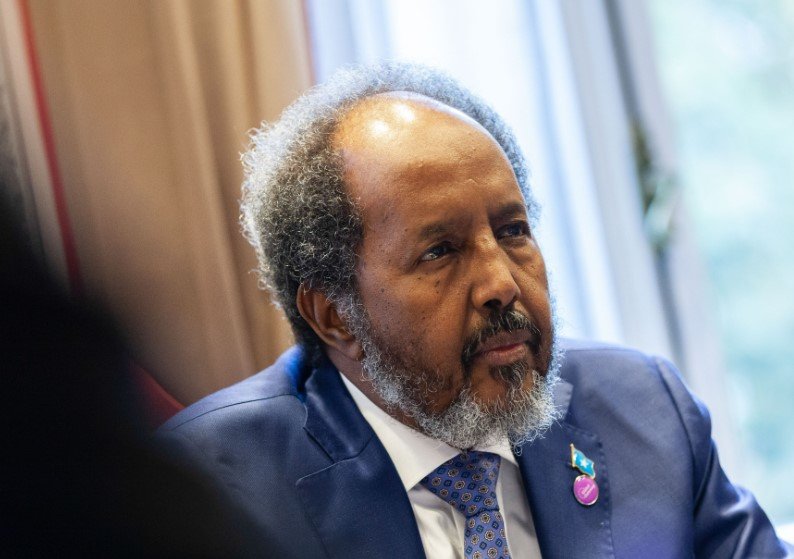Somali President Hassan Sheikh Mohamud landed in Egypt’s coastal city of El Alamein to a ceremonial welcome on Sunday, kicking off a high-stakes visit that signals deepening relations between Mogadishu and Cairo amid a shifting East African power landscape.
Mohamud’s trip—at the invitation of President Abdel Fattah el-Sisi—comes at a time when both countries are ramping up diplomatic engagements in a region grappling with overlapping security, economic, and geopolitical challenges.
Brotherhood and Symbolism Take Center Stage at El Alamein
As the Somali delegation touched down, red carpets and Egyptian honor guards were already in place. For a state visit that could have easily passed under the radar, the Egyptian government made a conscious choice to elevate the optics.
President Sisi didn’t just dispatch junior diplomats or a protocol officer—his administration gave Mohamud the full presidential treatment.
It wasn’t just about hospitality. It was about the message: Egypt is serious about Somalia.
Mohamud later told reporters, “The reception we received today reflects the deep historical and fraternal bonds between the people of Somalia and Egypt.”
One sentence. But layered with political weight.
The North African heavyweight is increasingly focused on the Horn—not merely for show but to consolidate influence in a region where Gulf states, Turkey, and even Russia are turning up their presence.

Behind the Handshakes: A Packed Agenda and Heavy Lifting Ahead
While the cameras captured handshakes and formal smiles, the real work is happening behind closed doors.
President Mohamud’s delegation includes senior officials from security, trade, and education ministries—signaling a multi-sectoral approach. Cairo has its eyes on counterterrorism cooperation, Red Sea corridor dynamics, and expanding trade routes to the Indian Ocean.
On the table:
-
Boosting security coordination on anti-terror intelligence, especially regarding al-Shabaab.
-
Fast-tracking student exchange programs and educational grants.
-
Facilitating port cooperation and logistics access to Egyptian and Somali coasts.
-
Supporting Somalia’s drive for economic reform and political normalization.
Don’t expect all of it to be finalized in one trip. But sources close to both governments suggest that a joint task force could be announced soon.
Egypt’s Growing Push into the Horn of Africa
This visit didn’t happen in a vacuum.
In the past year, Egypt has quietly deepened ties with Eritrea, Djibouti, and Sudan’s civilian factions. It’s also watching Ethiopia’s every move—especially its maritime ambitions.
What makes Somalia important here is geography.
Egypt wants to stay relevant in the Red Sea and Gulf of Aden. With Houthi unrest choking shipping lanes and the Suez Canal still vital, Cairo can’t afford to be absent from East Africa’s political calculus.
Somalia offers a chance—not just as a security ally but as a partner in regional diplomacy.
Earlier this year, Egypt hosted closed-door consultations with several IGAD member states, and this weekend’s talks are seen as part of that broader strategy.
The Trade and Education Angle: A Quiet Win for Both Sides
Beyond the weightier geopolitics, there’s a softer but equally vital dimension to the visit—trade facilitation and education diplomacy.
Egypt has long hosted Somali students in its universities. Al-Azhar, in particular, remains a cultural and religious bridge. But the numbers could grow.
Officials are mulling scholarship expansions, language training programs, and possibly even opening an Egyptian cultural center in Mogadishu.
On the trade front, things are still nascent. But there’s movement.
A bilateral committee is assessing the feasibility of:
-
Streamlining customs for Somali fish and livestock exports to Egypt.
-
Allowing Egyptian pharmaceutical and medical equipment suppliers into Somalia’s growing health market.
-
Exploring telecom partnerships, especially in mobile banking and infrastructure.
A senior Somali official quipped off-camera: “Cairo doesn’t just want to be a big brother—it wants to be a business partner.”
Regional Flashpoints Loom Over the Talks
No matter how warm the reception or optimistic the statements, the talks are inevitably shaped by hard realities across the region.
The Red Sea corridor is becoming one of the world’s most dangerous maritime theaters. Houthi attacks have impacted shipping costs. Meanwhile, Ethiopia’s deal with breakaway Somaliland continues to roil tensions.
Somalia, as ever, remains vulnerable to external manipulation—and Egypt wants to position itself as a counterbalance without stepping on toes.
One diplomat put it this way: “Egypt sees Somalia not as a pawn, but as a potential partner in stabilizing a deeply fractured zone.”
That’s a significant shift in tone.
Still, no formal statement has yet been made on Egypt’s exact position regarding the Ethiopia-Somaliland agreement. Analysts believe any statement would be cautiously worded to avoid entangling Egypt directly.
What’s Next? Follow-up Talks and Tangibles
While there’s no rush to ink major MOUs overnight, what matters more is what follows after El Alamein.
Somali sources confirm that Cairo has invited several Somali ministers to return later this year for technical-level discussions. The Planning and Trade ministries are expected to lead those efforts.
Here’s what might unfold in the next quarter:
| Sector | Expected Action | Timeline |
|---|---|---|
| Security | Launch of intelligence-sharing protocol | Q3 2025 |
| Trade | Bilateral customs facilitation roadmap | Q4 2025 |
| Education | Expanded scholarships for Somali students | Q1 2026 |
| Maritime | Joint feasibility study on port infrastructure | Q4 2025 |
It’s a slow march—but a strategic one.
A Warmer Tone, But No Room for Complacency
This weekend’s welcome was warm. The statements were friendly. The handshake was firm. But neither Egypt nor Somalia can afford to let optics replace substance.
Both leaders know this.
For Somalia, aligning with Egypt offers a chance to diversify partnerships in an increasingly fragmented region. For Egypt, the courtship of Somalia fits into its East Africa recalibration—and sends a message to other power players eyeing the Red Sea.
What happens next depends on whether both sides can turn symbolic visits into structured results.
